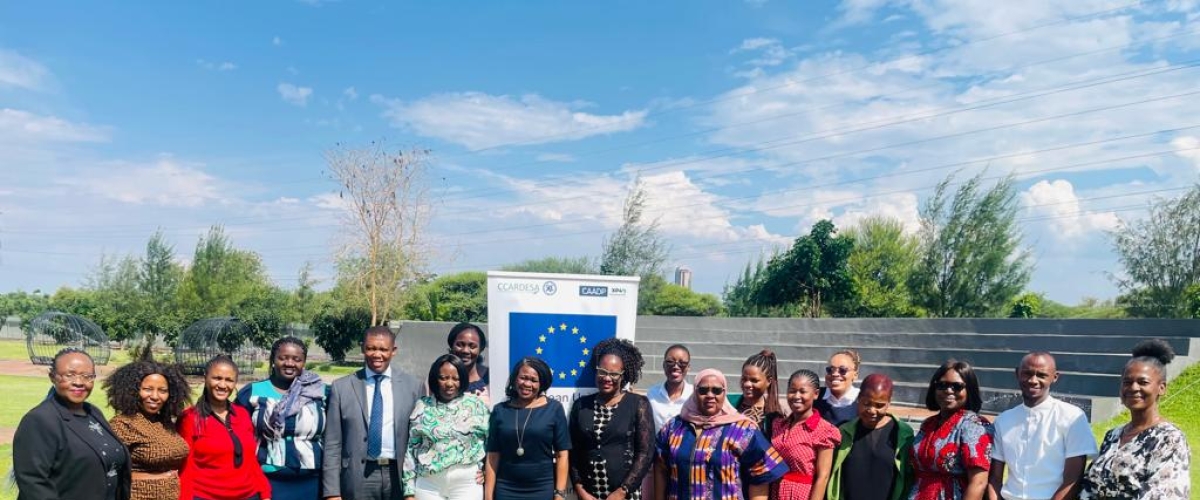
Women, youth, and social inclusion are placed as key themes in the CCARDESA strategic and operational plans signifying the great importance that the organisation attaches to these issues. As of 2018, the SADC region population stood at 345.2 million and had a GDP of US$721.3 billion. Women form over half of the regional populace and contribute significantly to agriculture, yet face persistent gender inequalities. Despite providing most of the agricultural labour, women often receive substantially less income than men, with a rural wage gap reaching up to 60% in some areas.
To further entrench the aspirations of this theme in its interventions, at a landmark event at the Grand Aria Hotel in Gaborone, Botswana, the Centre for Coordination of Agricultural Research and Development in Southern Africa (CCARDESA) held a critical Gender and Social Inclusion Validation policy meeting on November 20-21, 2023.
Officiating at the workshop, Dr. Baitsi Podisi, the CAADP-XP4 Coordinator, emphasized the need for candid feedback and a comprehensive review of the gender policy document. “Let us make this gender policy more effective and impactful to facilitate CCARDESA’s groundbreaking journey toward equality and empowerment”, he stressed.
Dr. Nawa Shalala Mwale, who was entrusted with spearheading the policy development process, highlighted the critical role of gender equality in eradicating poverty and food insecurity and ensuring sustainable food systems. She said, as this meeting coincides with the eve of Men's International Day and themed “Zero Suicide,” we need to underscore the urgency of addressing gender disparities, particularly the overlooked aspect of male mental health in a gender-balanced society”.
The meeting's slogan, "Walk the Gender Talk and Leave No One Behind," resonated with all attendees, reflecting a collective commitment to inclusivity.
The policy review process brought together esteemed stakeholders who meticulously examined the Gender, Youth, and Social Inclusion Policy, now poised for approval by the CCARDESA Staff and Board. Discussions focused on the importance of inclusivity, stressing the need for equitable representation of women, youth, and men in all initiatives. Recognizing the often-neglected male demographic, participants called for the implementation of boys' empowerment programs to balance gender parity.
In mainstreaming gender in agricultural programs, it is critical to understand that women and men experience life differently, they have different needs, priorities, opportunities, and concerns and various development interventions affect them differently.
Dr. Podisi concluded the workshop with heartfelt gratitude, acknowledging the dedication of delegates amidst their busy year-end schedules. He expanded on CCARDESA's efforts, including the existence of the CCARDESA Environmental and Social Sustainability policy framework. This framework is aimed at ensuring that CCARDESA programs do not cause harm to the environment and to society it also guards against sexually exploitative behavior in the execution of research and development programs. These polices are also aligned not only with regional policies such as the Gender Protocol but with continental and global commitments such as the Malabo Declaration and the Sustainable Development Goals.
Following the stakeholder validation, the next phase of the Gender Equality and Inclusion policy involves an internal review, leading to its anticipated approval. This policy is more than a mere formality; it represents a tangible commitment to integrating gender inclusivity into agricultural research and development. The emphasis on accountability, regional assessment, and vigilant reporting on gender issues underlines the determination of CCARDESA and its member states to ensure no one is left behind in their journey toward gender-balanced agriculture.
The meeting participants were drawn from 8 SADC countries including gender focal point persons, researchers, agricultural scientists, and policymakers among others.
The gender policy development and validation is an initiative of the CAADP-XP4 Programme which is funded by the European Union and is financed through the International Fund for Agriculture Development (IFAD).





